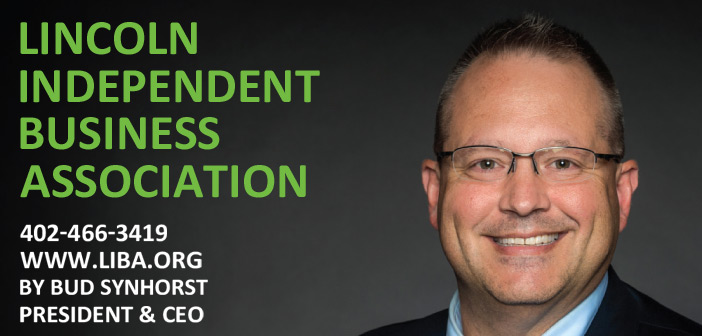The Value of Being Involved
The Nebraska Legislature is back in full swing! Bill introduction, committee hearings, and floor debate are happening at a fast pace. The 2020 session is only a 60 day session, which means many will try to get things done as quickly as they can…if that is really possible.
Several times in the past few months, people have talked with me pretty extensively about getting involved in politics and have posed the question, “Why does it matter?” As we prepare for our annual legislative forum with inviting all 49 state senators, I want to take a moment to get into this topic a bit more.
As a business owner, so many parts of your business are “political.” From registering your business, getting the appropriate EIN number, setting up checking accounts, building out your office, hiring employees, charging and reporting sales taxes, paying taxes, and the list goes on. So politics matter a great deal when it comes to protecting your business.
Over the years, I cannot count how many times a business owner has come to me with the question, “What can I do about ____ ?” Ultimately, my recommendation is to find out who your representative is for local, state, and federal matters. You can do this very easily on the internet. I believe contacting our representatives is our duty as citizens to help hold them accountable. I frequently email my state senator or school board representative or city council member sharing my thoughts on issues they are discussing. I hope you will become more politically involved and reach out to your representatives about issues which can and will have an impact on you and your business. Below are some guidelines, so to speak, for reaching out to your representatives:
- Make sure you identify yourself and your business and make sure they know you are a constituent in their district.
- Keep the conversation about the issue and not make it personal attack on the elected official or their staff.
- Tell them your story. This means to talk about your business and give them details about your business. If it seems plausible, invite them to your business to have a tour or a conversation.
- Explain why you support or oppose whatever matter you are calling about (note support or opposition—it is always good to let them know your position when you both agree and disagree with what may be their position. Also keep in mind, they may still be making up their mind, so it is bad practice to assume their position and “lecture” them on your position. You may be able to help them understand why the policy is good or bad for business.
- Be brief and calm. Remember, they have lives too and many constituents are often calling them, so respect their time.
- Thank them for their time and give them your contact information should they want to discuss the issue further with you.
Note, these guidelines are good for a letter, email, or phone call. Taking time to talk with our elected officials is an opportunity to share your story with them and have a civil conversation about issues. What I have found with elected officials, if you take time to contact them and do so respectfully, you will have a much greater chance to have a conversation about issues which you may agree or disagree with them.
It is imperative we as citizens and business owners engage with our elected officials to discuss how we can make our community, state, region, and country the best we possibly can be. You can find out how to contact your elected officials on the Lancaster County Election Commission page, Nebraska Legislature page, City Council page, etc. Or, if you are having problems locating whom to call about issues, feel free to call us at the LIBA office at (402) 466-3419 and we will be ready to assist you.
 LIBA studies and promotes these types of issues that are important to businesses and our community. If you have an interest in joining LIBA, please call me at (402) 466-3419. LIBA membership is not restricted to just businesses. We also have “individual” memberships for those who want to help influence our local government decisions.
LIBA studies and promotes these types of issues that are important to businesses and our community. If you have an interest in joining LIBA, please call me at (402) 466-3419. LIBA membership is not restricted to just businesses. We also have “individual” memberships for those who want to help influence our local government decisions.
For more information on LIBA, visit Liba.org.

